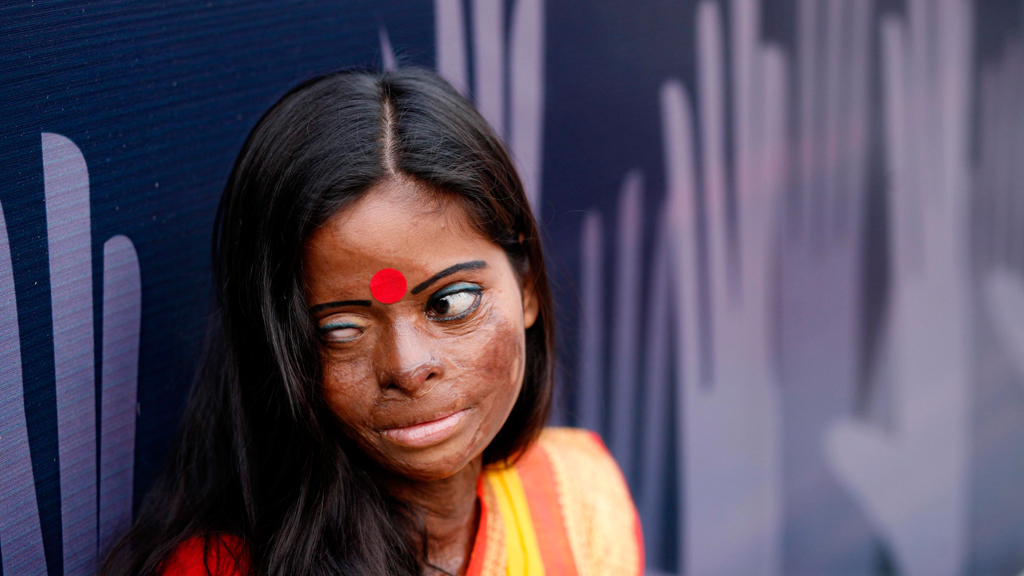Acid Attack – A Cowardly Move by Male Chauvinists

Bangladeshi acid survivor Hasina attends a campaign program to End Violence Against Women organized by a national network in Bangladesh supported by UNFPA, Bangladesh, November 24, 2010. (© picture-alliance/dpa)
Women are victims of 80% of the roughly 1,500 acid attacks reported globally each year, says London-based charity Acid Survivors Trust International. These cowardly moves are meant to maim, disfigure or blind the victims. It is an atrocious act to cause shame, pain and suffering for other people.
These attacks are most common in Cambodia, followed by Bangladesh, Pakistan, Afghanistan and India. Most victims are women, who do not want to submit to the will of some male “admirer”, to say it sarcastically. Jealousy is often the motive for this horrible kind of attack.
#feminist end #acidattack s pic.twitter.com/4CdVVDLqN0
— Apocalypse (@inartic) 4. Juni 2015
This base motive is already reason enough for some people to commit crime, but when it is combined with a social environment that is conducive to such crime, it may be fatal. India’s National Commission for Women (NCW) points out that bottles of acid are too easily available in India. Acid can be bought easily although its sale was banned by the Supreme Court in 2013. Locally produced household cleaners, which contain highly concentrated acids, are cheap and plentiful in markets, said NCW chairman, Lalita Kumaramangalam.
According to a research by the charity Acid Survivors Foundation India (ASFI) in India 349 acid attacks were reported in 2014, up from 116 in 2013 and 106 in 2012. This has to stop! Luckily different organizations have reacted. For example a campaign to support acid attack survivors was launched by ASFI a few days ago.
Yest, #acidattack survivors launched a campaign called ‘War against acid violence’. Here is the report: http://t.co/j4JHUqLAqC @livemint
— Vidya (@VidyaKrishnan) 2. Juni 2015
But what is behind this horrible act? Are the men who have committed acid attack the only ones who have experienced jealousy? Isn’t jealousy an emotion that every human being can feel? Why are some men able to cope with this feeling, and some not?
Jealousy is basically just insecurity or fear over an anticipated loss, which – in many cases of acid attack – often means loss of status. For some men being rejected means losing face. On the other hand, how many men in this world have experienced rejection by a woman? Is the disappointment something that a man can never recover from? A real man can handle it. Even though he may have a broken heart, he would never harm a woman he truly admires.
On the contrary, men who think that they are superior to women can never handle a rejection. Their low self-esteem and pride are so injured that they are only able to respond by committing a cowardly crime. And it was not about admiration in the first place, it was only about getting what they want. Male chauvinism certainly encourages unmanly crimes like acid attacks. And this attitude cannot be changed by law. It is a much harder fight to change people’s mindsets.
Author: Marjory Linardy
Editor: Grahame Lucas
WTO RECOMMENDS
Acid attacks: when love turns into hate
Acid attacks in several Asian countries like India, Pakistan, Bangladesh and Afghanistan have been plaguing women for a very long time. In fact, even men have sometimes fallen prey to obsessed lovers who use this method to take revenge. Here is a repost of an older Women Talk Online report in which an acid attack survivor, Sonali Mukherjee, spoke to Samrah Fatima about her experiences. (From October 13, 2014)
Acid attacks: a tool to threaten women
Women in Pakistan’s troubled province Baluchistan are fearful after a spate of attacks that targeted women going out without male family members. A couple of days before Eid (the Islamic festival marking the end of Ramadan), two men on a motorcycle sprayed acid-filled syringes on two teenage girls who were returning from the market in Mastung, a district in Pakistan’s troubled province Baluchistan. (From August 20, 2014)
Pakistani civil society demands justice for victims of acid attacks
While civil society in Pakistan demands stricter punishment for the perpetrators of acid attacks, hundreds of women continue to fall victim to the heinous crime of vitriolage. (From April 1, 2012)
Shortlink: http://blogs.dw.com/womentalkonline/?p=14477






